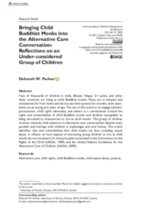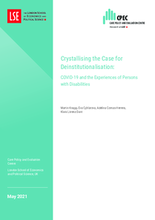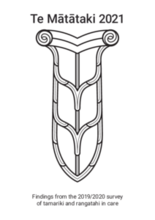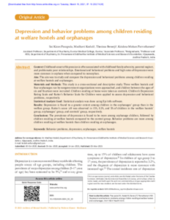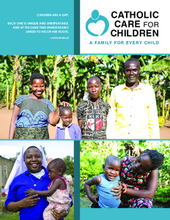Displaying 161 - 170 of 771
This article identifies risks and vulnerabilities that child monks can face, including sexual abuse. It reflects on how aspects of entrusting young children to live as child monks do not necessarily fit with principles articulated in the Convention on the Rights of the Child (UNGA, 1989) and the United Nations Guidelines for the Alternative Care of Children (UNGA, 2009).
Millions of persons with disabilities, children and older persons live in congregate settings. Whilst the motivation for providing such care may be well-intentioned, that is not always the case. Many of those settings are ‘institutional’, with residents denied autonomy and choice, provided with poor quality health and social care, and experiencing social isolation, neglect or abuse. This report summarises the evidence and experiences of persons living in congregate settings in general, and in terms of the impact of COVID-19, to understand the barriers to deinstitutionalisation, and to highlight the approaches that have sought to overcome those barriers.
This report presents findings from Te Tohu o te Ora, the first national survey of tamariki and rangatahi in care.
The authors of this study investigated the prevalence rates of childhood trauma, depressive symptoms, anxiety symptoms and suicidal behaviors among Vietnamese adolescents and compared the differences between institutionalized adolescents (IAs) and noninstitutionalized adolescents (NIAs). In addition, they examined the multidimensional associations between childhood trauma and psychopathology among IAs.
The aim of this article was to study and compare the depression and behavioral problems among children residing at welfare hostels and orphanages.
This article from the Journal of Clinical Child & Adolescent Psychology examines the extent to which psychosocial deprivation increases the risk of later cognitive and psychiatric difficulties and the downstream consequences of this for risk-taking behavior in adolescence. The current study included 165 children, 113 with a history of institutionalization and 52 with no such history.
This meta-analysis aims to clarify the size of the associations between disinhibited social engagement behavior (DSEB) and attachment insecurity or disorganization.
This study uses data from a survey on the health and development of 420 children mostly under the age of three, placed in 12 infant care institutions between 1958 and 1961 in Zurich, Switzerland. The children exhibited significant delays in cognitive, social, and motor development in the first years of life. Moreover, a follow-up of a subsample of 143 children about 10 years later revealed persistent difficulties, including depression, school related-problems, and stereotypes.
The authors of this study used data from a longitudinal randomized controlled trial of foster care for institutionally reared children to examine whether caregiving quality and stressful life events (SLEs) in early adolescence (age 12) influence patterns of hypothalamic–pituitary–adrenal (HPA) axis and sympathetic nervous system (SNS) reactivity.
Catholic Care for Children (CCC) is a visionary initiative, led by Catholic sisters, to see children growing up in safe, nurturing families. Guided by the biblical mandate to care for the most vulnerable and animated by the principles of Catholic Social Teaching—especially the dignity of each person—CCC teams are reducing the need for institutional care by encouraging and facilitating family- and community-based care for children.

